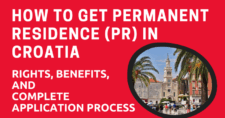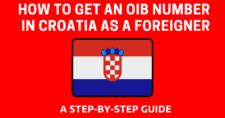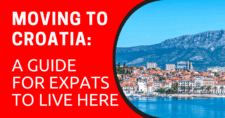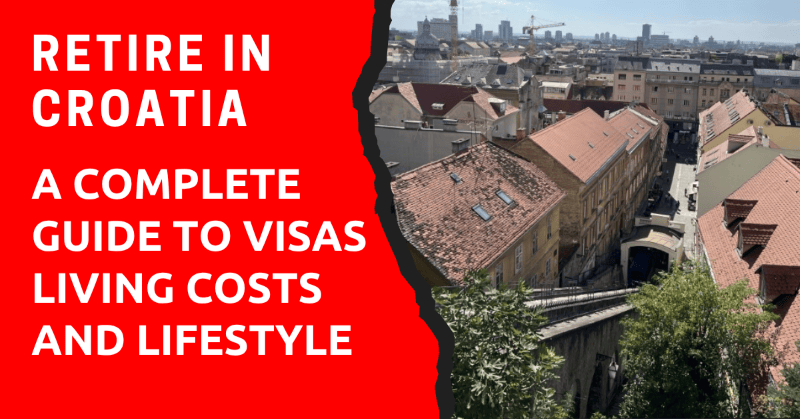
This article will take approximately 42 minutes to read. Don't have the time right now? No worries. Email the ad-free version of the article to yourself and read it later!
Thinking about retiring in Croatia? In this article, we’ll guide you through the process of applying for a long-term visa, the necessary documents, financial requirements, and everything you need to know for retirement here, step by step.
In the last article, I shared my experience of moving to work in Croatia in 2024. This time, I’d like to explore another equally fascinating aspect: “Retiring in Croatia.”
Often when I’m sipping coffee in Split, I see many elderly expats strolling along hand in hand by the beach or chilling with a book under the sun. It makes me think, “This place seems perfect for retirement living.” The surroundings are relaxing, people are laid-back and smiling, and it’s safe enough to walk around at night comfortably. There’s a variety of activities to keep you entertained, from surfing, diving, sailing, to hiking, making retirement life much more colorful and exciting.
So, Croatia is not just a tourist destination, it’s a place suited for “European-style retirement living” with a lower cost of living and more vibrancy. In this article, we’ll introduce you to Croatia from this perspective, share experiences from our senior neighbors, and provide essential info that might help you make a decision more easily.
Disclaimer: This article may include links to products or services offered by ExpatDen's partners, which give us commissions when you click on them. Although this may influence how they appear in the text, we only recommend solutions that we would use in your situation. Read more in our Advertising Disclosure.
Contents
- Why do Europeans choose to retire in Croatia?
- Is Croatia Suitable for Asians or Americans Planning to Retire?
- Is Croatia Safe for Seniors?
- Planning Your Retirement in Croatia
- Healthcare and Health Insurance
- What Are Nursing Homes Like in Croatia?
- Does Croatia Offer In-Home Care and Nursing Assistance?
- Is Transportation and Amenities for the Elderly Good?
- Public Area Facilities
- How Should You Adapt to the Croatian Language and Culture?
- What’s the Food Culture Like?
- Recommended Cities for Retirement in Croatia
- Who is Suited for Retirement Here?
- Who Might Not Be a Good Fit?
- How to Plan Your Retirement Move to Croatia?
Why do Europeans choose to retire in Croatia?
Many might not expect that Croatia, having recently emerged from a war, would become a popular destination for expats wanting to retire.
Low cost of living
One of the main reasons Europeans choose to retire in Croatia is because of the “cost of living being distinctly lower than in Western European countries.” According to Numbeo in 2024, the average cost of living in Croatia is about 30 – 40% lower than in countries like Germany or Sweden. This applies to accommodation, food, and various services, all of which are more affordable, yet the quality of life remains excellent.
Take my boss, for example. He has been using his pension from working in Sweden to buy a house, purchase a car, and live in Croatia for over 5 years now. He once visited as a tourist and felt the atmosphere was just right for the retirement life he had dreamed of, and it truly was.
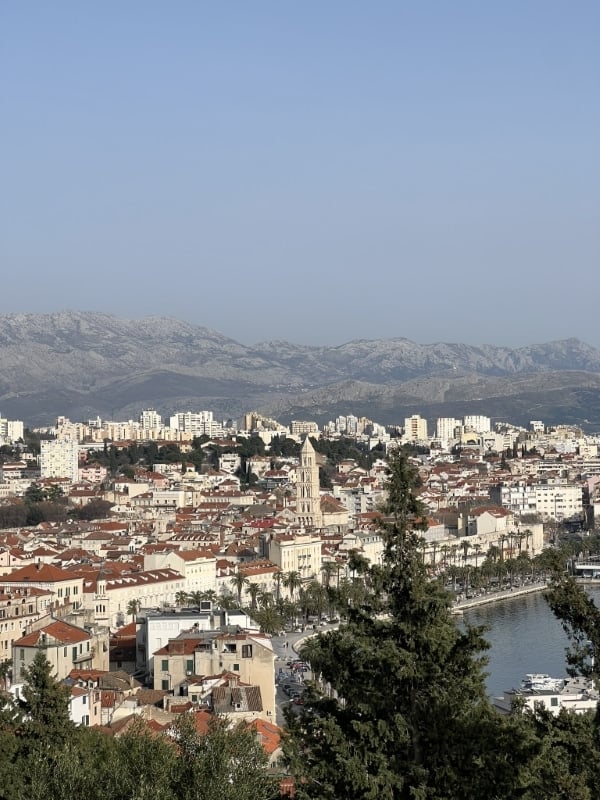
He told me that the vibe here is like Sweden in the summer all year round, but the cost of living is half as much. The best part is there’s always outdoor activities he loves to do, from sailing, diving, and rock climbing to even golfing.
Meanwhile, our Polish neighbor shared that buying a seafront house in Croatia got her a bigger home, in a better location, and at a more reasonable price compared to just a small apartment back in her home country. Not only is the view stunning here, but the people are also friendly and respect privacy, making her feel comfortable living a slow-paced life in a large house she never dreamed she would have. She said that simply staying home, gardening, reading, or just gazing at the sea feels fulfilling enough for the retirement life she’s been seeking.
Lifestyle
Additionally, Croatia boasts a diverse landscape with its lengthy Adriatic coastline, mountains, forests, and quaint old towns. With a warm climate that’s not as cold as Northern Europe, it’s an ideal place for living a slow, relaxed lifestyle in retirement.
Visa
Importantly, since Croatia officially joined the Schengen Area in 2023, it’s even easier for Europeans to travel and reside there. There’s no need for a visa or extra paperwork; just use your EU country’s ID card or passport to settle in and start living. This has made Croatia truly one of the trending spots for retirement planning among Europeans.
Is Croatia Suitable for Asians or Americans Planning to Retire?
For Asians and Americans, Croatia is quite fitting. Although you might have to prepare quite a bit of visa paperwork, if you’re someone who loves the sea, mountains, beaches, and sunshine, Croatia is one of the best destinations in Europe right now. It boasts diverse landscapes, beautiful seas, warm weather, and a cost of living much lower than Western European countries. Also, if you’re Thai, you’ll likely enjoy gardening or planting trees like bananas, mangoes, kaffir lime, lime, or holy basil since the climate here is just like Thailand.
The main consideration should be the time it takes to travel back to your home country, which may be longer than usual, and you might not be able to go back as often as you’d like. But if you’re craving Asian food or bubble tea, no need to worry! There are plenty of Asian restaurants to choose from here, whether it’s Thai, Chinese, Japanese, or Korean, which will make life in Croatia happier, no matter how far away from home you are.
Is Croatia Safe for Seniors?
Croatia is considered one of the safest countries in Europe. According to the Global Peace Index 2024, Croatia ranks 15th out of over 160 countries worldwide in terms of peace and safety, on par with countries like Finland and Switzerland. There is hardly any news of violent crime or political unrest here, and life is calm and simple.
Elderly people in Croatia can live peacefully and independently. It’s not unusual to see seniors walking to the market or sipping coffee at cafes alone, feeling perfectly at ease. Even taking a stroll along the beach at night alone is quite normal because the daily safety here is exceptionally high. There’s no need to be overly cautious, so they can go about freely on their own.
When I stroll through cities like Zagreb, Split, or Dubrovnik, I often see elderly people leisurely walking along streets or in parks. Many homes leave their doors and windows open to catch the breeze all day without needing to be tightly locked, which is a contrast to some larger European cities where you have to be cautious even during the daytime. Life here is ideal for retirees seeking peace and a sense of safety every day.
Although there are reports of petty crimes such as pickpocketing in tourist areas during the summer, overall, the crime rate in Croatia is considered “very low” by European standards. According to statistics from Numbeo in 2025, Croatia has a Crime Index score of just 24.6, which is lower than Germany, France, or Italy. This is likely one of the main reasons why many retirees from Europe choose to live a peaceful, safe, and retired life here.
Planning Your Retirement in Croatia
Let’s take a look at what you need to know to plan your retirement in Croatia effectively.
Cost of Living
If you choose to live in a secondary city or a small town in Croatia, the cost of living isn’t as high as many might think. A simple life can be had for less than €1,000 per month. Or, if you’re single and really keen on living frugally, you could manage on just €300 – €500 per month. Daily life isn’t complicated: buy groceries from the supermarket or local markets to cook your own meals, take leisurely walks, sunbathe on the beach, and enjoy life at a slower pace.
My former boss, before starting his business, had planned to fully enjoy his retirement life with his Thai wife in Split. He mentioned that one day he barely spent any money because there wasn’t much to pay for. No long travels, no extravagant purchases, just buying fresh groceries, cooking at home, and taking regular beach walks. Some days he’d have a small beer at the local bar, but on the whole, he spent just €10-€15 a day. If you look at it monthly, it’s around €500-€1,000. For someone without debts or major responsibilities, it’s quite a stress-free way of living.
After Retirement, Is It Better to Rent or Buy a Home in Croatia?
If you’re planning to stay long-term and want to genuinely settle down, buying a house in Croatia is an interesting option and it’s not as expensive as many might think. The average house price across the country is about €2,200 per square meter. However, if you’re looking in suburbs or small towns, prices might be as low as €1,500 – €1,800 per square meter.
Like my Swedish boss, he decided to use his retirement money to buy a seaside house in Kaštela, a small town just 10-15 minutes from Split. He bought a mid-sized house with a small garden by the sea for about €150,000. He mentioned that just the rent for an apartment in Stockholm is almost half the price of this house. After buying the house here, he no longer has to worry about rent and can enjoy a peaceful life by the sea with a beach right in front of his house.
If you’re still unsure and planning to return home again, renting an apartment is a suitable option. In popular coastal cities like Split or Dubrovnik, a one-bedroom apartment in the city center will cost around €500 – €3,000 per month (based on data from Numbeo and Expatistan 2024), depending on the location, proximity to the sea, and the condition of the home. However, if you opt for smaller towns like Rijeka or Sibenik, which offer a more tranquil atmosphere and are less bustling than the big cities, you can rent a house or apartment at a lower cost ranging from €250 – €700 per month. This is an excellent choice for those seeking peace and wanting to save money in the long run.
The process of buying a house in Croatia for expats isn’t too complex, especially if you’re an EU national. However, if you’re Thai or from outside the EU, you’ll need approval from the Ministry of Justice in Croatia first, which can take several months. Most people hire a local lawyer to handle the procedure, including checking property titles and registering the purchase agreement with the Land Registry.
Is Buying a House in Croatia Complicated?
For expats holding citizenship from European Union (EU) countries, buying a home in Croatia is almost without restrictions. You can purchase nearly any type of property, whether it’s a house with land, an apartment, or even undeveloped land (in some areas), without needing special permission from the government. You just need an OIB (Croatian tax identification number) and the services of a local lawyer or notary to legally finalize the transaction.
If you’re an expat from outside the EU, like an Asian or American, you can still buy a home, but you’ll need to go through more complex steps. Overall, it’s not too difficult; you just need to allow some time and plan carefully.
One of my acquaintances, a retired American, decided to move to Croatia with his wife. They chose the peaceful countryside near Rijeka because the cost of living isn’t high, the weather is nice, and it’s not far from major cities. Before deciding to buy a house, he tried living there first by renting a home for six months to explore the neighborhood he truly wanted to stay in, observe the surroundings, get to know the neighbors, and see if the lifestyle suited them.
While renting, he started preparing the basic documents needed to buy a house, beginning with applying for an OIB (tax identification number), which is essential for expats wanting to handle financial transactions in Croatia, like opening a bank account or signing a house purchase contract. After that, he began searching for a house through local agencies that could communicate in English and had a local lawyer help review the accompanying documents.
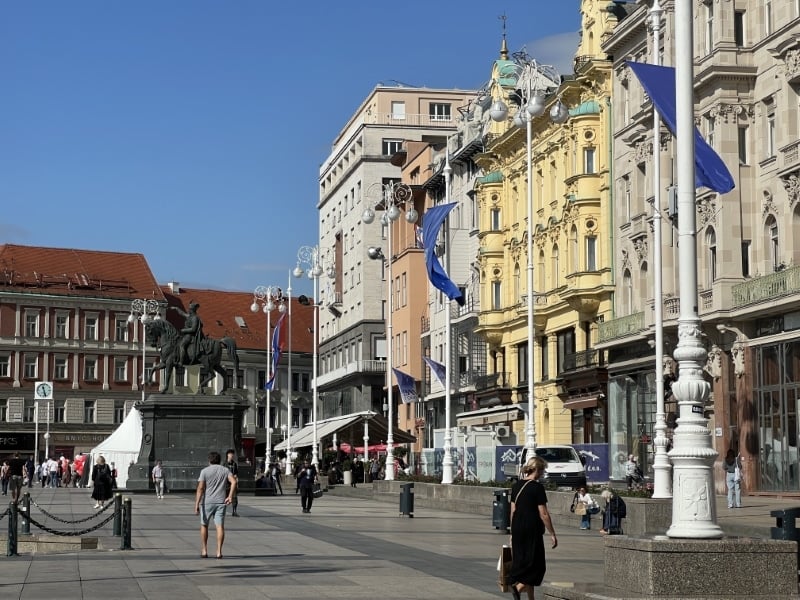
He was charmed by a single-story house with a small garden and a peaceful mountain view, and wanted to make a pre-contract with the owner, putting down a 10% deposit, which is a standard practice here. Then, he moved on to the longest step, which is applying for permission from Croatia’s Ministry of Justice to legally own property as a non-EU citizen expat.
They mentioned that several sets of documents need to be prepared, such as a purchase agreement (along with a Croatian translation), property title deed and a copy from the homeowner, a document stating the purpose of purchase (for residence, not business), a certificate from the embassy or the Croatian Ministry of Foreign Affairs to confirm that the USA and Croatia have a “Reciprocity Principle” which allows Croatians to own property in that country as well.
Afterwards, the lawyer will gather all documents and send them to the Ministry of Justice in Zagreb. Approval may take about 6-9 months, depending on the complexity of the documents or the property’s location.
After receiving the official approval letter, he scheduled to finalize the purchase agreement with the homeowner and proceed with registering the property at the Land Registry. He also handled the payment of the property transfer tax, which is 3% of the sale price. Initially, this might have seemed complicated—especially with the long wait for government approval. But if you have a good lawyer or agency handling things for you, it’s a much clearer and straightforward process than you’d think.
On the day he got the keys to the house, he told us, “Even though it took time, once I got it, it felt like it was truly our home—a place that’s perfectly ready for genuine retirement living.”
Does Croatia Have a Retirement Visa?
Although there isn’t a “retirement visa” yet, expats can still apply for a Temporary Stay visa, citing the reason as “for retirement living.” Many, especially from Northern Europe and some Asian countries, have started using this option to enjoy a peaceful retirement life in Croatia.
Based on experience, getting a visa isn’t complicated, but it does take a bit of time. Like my Japanese friends who retired here after COVID, they came solely to live after retirement. They had to prepare documents, especially proof of sufficient funds in the bank, along with other standard requirements.
He shared that when applying for a long-term residency visa in Croatia, the authorities had only one concern: financial proof. They worried that he might not have enough money to cover his expenses during his stay and might struggle to live there, as they viewed him as an Asian. However, he had worked and lived in Amsterdam for most of his life and had extensive experience living in Europe, so he felt that Croatia shouldn’t be too difficult. Moreover, there were many aspects similar to Asian culture. Therefore, he prepared additional documents, such as investment lists, funds, stocks, and bank accounts, to show that he had sufficient financial stability to live there.
Besides financial proof, other required documents include proof of address in Croatia, health insurance covering the country, and a criminal record certificate from your home country. These need to be translated into Croatian and stamped to be legally valid in Croatia. Preparing these documents takes time and can incur costs, but having a local lawyer or an agency assist can make the process smooth and hassle-free.
If you’ve never had a Schengen visa before, it’s crucial to prepare your documents thoroughly and in detail, especially for applying for a Temporary Stay visa for retirement. The authorities will rigorously check for readiness and reliability. Key documents to prepare include:
- A valid passport with blank pages for stamps
- Financial proof such as a bank book or a salary certificate showing you have enough funds to live in Croatia
- Proof of accommodation, like a rental agreement or a property ownership certificate for a house/condo
- Health insurance covering medical expenses in Croatia
- A criminal record certificate from your home country, translated into Croatian and certified
- A letter explaining your reasons for applying for long-term residence, including your retirement living plans
Once all the documents are complete, submit your application at the immigration office in Croatia or via the Croatian embassy in your home country. If everything is in order, you will be granted a 1-year visa, which is renewable for the following year. You are required to report to the local police within 3 days of entering the country and update your address if it changes later on.
If you are planning to retire and interested in applying for this type of residence visa, it’s recommended to start preparing your documents at least 2 – 3 months before your travel. Also, get information from reliable sources like the Croatian embassy website or consult with a lawyer or company experienced in visa applications specifically. This can greatly reduce the risk of incomplete documentation or rejection.
Of course, visa application conditions change over time. We suggest reading directly from the Ministry of Foreign and European Affairs website for the best information.
Do Retirees in Croatia Have to Pay Taxes?
Anyone living in Croatia for 183 days per year who is not an EU citizen, such as Thai, Japanese, or American nationals, must pay taxes based on “Tax Residency.” However, if your home country has a Double Taxation Agreement (DTA) with Croatia, you might not have to pay double taxes.
If you’ve already paid pension tax, like in Thailand, there is no double tax agreement with Croatia (as of 2025). So, Thai people living here for more than 183 days must pay tax on pensions received from Thailand, unless you can prove that those funds were previously taxed or are exempt in the originating country. This will also depend on the interpretation of local Croatian tax officials. Thus, consulting with a lawyer or local accountant who specializes in international tax is essential.
For the personal income tax structure, it’s similar to other countries in Europe. Just annual income up to €50,400 will be taxed at a rate of 20%. If it exceeds that, it moves up to 30%. However, most retirees tend to have an income below the level that would incur the maximum rate anyway.
If your income falls into the category of subsistence, like pensions or family transfers not intended for investment, you can seek additional advice to possibly consider deductions or exemptions in some cases.
Of course, taxes are always a complex topic, especially when multiple countries are involved. If you want to read more on your own, you can check out the information directly from the Croatian Revenue Agency’s website at the Croatian Tax Office
Healthcare and Health Insurance
As we age, health becomes an unavoidable concern. If you’re considering a place to retire, it’s wise to choose a country with accessible public healthcare and a good health insurance system, which can significantly improve your quality of life in retirement. In Croatia, for example, the healthcare system is quite comprehensive. Especially if you register with the state health insurance system called HZZO (Hrvatski zavod za zdravstveno osiguranje), which is available to everyone residing long-term. Once registered, you’ll have the right to choose a family doctor, or GP (General Practitioner). This GP will be your first point of contact for health concerns, general check-ups, and referrals to specialists if necessary.
My former boss, who is already 65 years old, has diabetes and high blood pressure, and needs to take medication daily. After moving here, he immediately registered with HZZO and chose a GP who speaks English to ensure smooth communication and treatment. He told me, “I’m really lucky that the system here is flexible and genuinely cares. As long as you have the necessary documents, like previous medical records from your home country or a letter from your former doctor, translated into English or Croatian, it will help doctors here understand more quickly.”
If you need to see a specialist, like for heart or kidney issues, the GP will decide whether to refer you or not. This system means patients don’t have to run around finding specialists themselves. However, if it’s a public hospital, you might have to wait quite a while. Because of situations like this, many people, including my boss, choose to also have private health insurance. He uses a private insurance company based in Croatia, paying an extra €70-100 monthly to access special services, like faster annual checkups, seeing specialists without waiting, and choosing a private hospital for quicker service.
If you’re in the HZZO system, you can even get some prescriptions for free or at a reduced rate. Vitamins and supplements are also widely available.
What Are Nursing Homes Like in Croatia?
One thing that surprised me a bit when I moved there was how nice the retirement homes close to my house looked. You can enjoy beautiful sea views from your room’s balcony, along with a clean and green garden. In Croatia, retirement homes are both government-operated (subsidized) and privately run, with each having different standards. Overall, they are safe, clean, and provide suitable care for the elderly, especially in major cities like Zagreb, Rijeka, Split, and other tourist towns where many expats reside.
A friend of mine told me that getting into a senior care home here isn’t as straightforward as just applying, especially if it’s a government-run facility. They have a selection process based on criteria such as having permanent residency status in Croatia or being part of the tax system for a certain period. In many cases, they also categorize “admission rights” into tiers based on income levels or tax payment history.
State housing has the advantage of being quite affordable, averaging around €300 – €500 per month, which includes accommodation, basic meals, and some types of healthcare. However, as it is a state-supported system, there is often a very long waiting list, and it usually only accepts Croatian residents or those with permanent residency who are within the state health insurance system (HZZO). So, while the price is great, it’s not really an option for expats in general.
Alternatively, private residences are available both in major urban areas like Zagreb, Rijeka, or seaside tourist towns such as Split and Dubrovnik. The highlight is they can accommodate expats, whether you’re on a long-term visa or a semi-permanent stay, depending on your health insurance documents and legal status. The cost for private accommodations typically ranges from €1,000 to €2,500 per month, varying based on the level of care, such as a private room or shared room, whether there is 24-hour nursing care, and including special services like physiotherapy activities, rehabilitation programs, specialized meals, and care for bedridden patients or those needing special attention.
My friend says that many retirement homes in Croatia prioritize the “quality of life” for the elderly. They don’t just provide basic care but also offer additional services like outdoor gardens, libraries, yoga classes, or group activities to help residents socialize, ease loneliness, and feel valued every day.
If you’re retiring there and want some assistance, you can rely on nursing homes too. Just get a Temporary Stay visa and choose a quality private facility that understands cultural diversity and can communicate in English, it’s a safe and comforting choice. Especially after you’ve been retired for about 10 years, you might need more specialized health or care services. Planning for this is nothing to be ashamed of.
Does Croatia Offer In-Home Care and Nursing Assistance?
If you want to keep living in your own home and just need occasional or daily help, Croatia offers comprehensive in-home care and home nursing services. This includes assistance with bathing, administering medication, trips to the hospital, cooking, cleaning, at-home physical therapy, staying overnight as a caretaker, or just providing company at night.
In Croatia, hiring an hourly caregiver costs around €7–€15 per hour. If you need ongoing support, monthly packages are also available. Prices vary depending on how many hours you need and the type of care required. This kind of service is ideal for seniors who are still mostly independent but need a bit of help with everyday task, like meal prep, managing medications, or getting to medical appointments. It’s especially helpful for those who want to stay in their own home as long as possible rather than moving into a nursing facility.
In Zagreb, for example, there’s a service called Medikor that sends professional nurses to your home, whether you’re an elderly resident or recovering from illness. In Split, a service called Moja Kućna Njega focuses on day-to-day care—you can reach out to them through Facebook or by calling directly. Some places even have English-speaking staff, which makes things much easier for long-term expats.
But from what I’ve observed, many seniors here are still very fit because there are plenty of exercise areas, or they can go swimming every day. Some can float in the sea for hours comfortably, which I can’t even do. Some seem to be over 70, yet they can float steadily in the middle of the bay like dolphins for hours while I’m younger and get out of breath after just 5 minutes…
Is Transportation and Amenities for the Elderly Good?
When it comes to travel for seniors, the public transportation here is quite senior-friendly. Trams and buses in Zagreb usually have spaces for wheelchairs or walkers and clear signs. Most public drivers are patient and ready to help, especially if they notice the passenger is elderly or has mobility issues.
However, many old towns in Croatia, like Dubrovnik or the old town zone of Split, because they are preserved towns, still have stone pathways, uneven pavements, and lots of stairs. This can be challenging for wheelchair or cane users, especially if you choose to live on a hill or in narrow alleys. So, if you or your partner need ease of movement, you should consider finding a place in an easily accessible area, like the ground floor of an apartment building or near main roads with wheelchair ramps.
Public Area Facilities
One area where Croatia continually improves is accessibility for seniors and people with disabilities in public spaces. Especially in major cities like Zagreb, Split, or Rijeka, you’ll start to notice ramps at the entrances of government buildings, disabled toilets in shopping malls, and elevators in high-rise buildings installed to standard. Plus, some tram and bus lines in Zagreb offer wheelchair space, stop buttons for the disabled, and most drivers are patient and ready to assist seniors getting on and off.
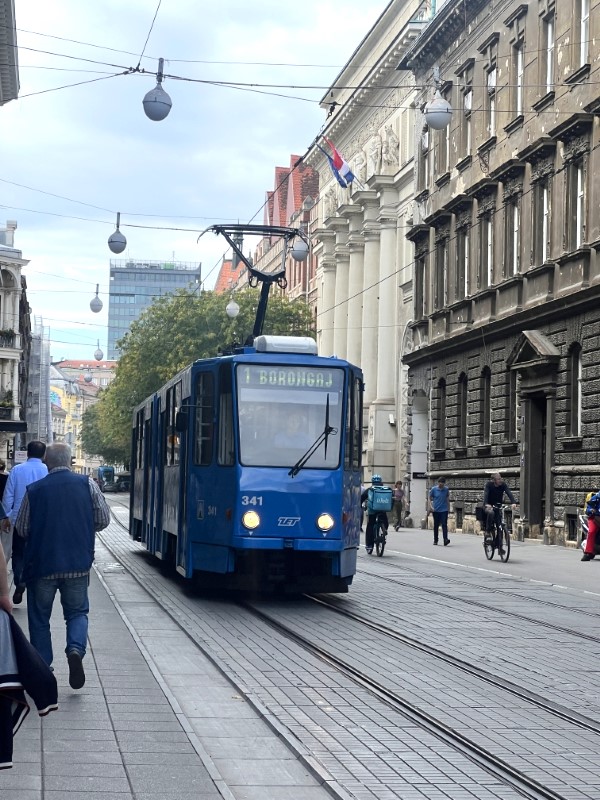
Impressively, at public beaches in many tourist cities, such as Bačvice (Split), Lapad Beach (Dubrovnik), or Opatija Riviera, ramps for wheelchairs, slip-resistant rails into the water, and in some places, slip-resistant rubber mats extending to the sea are being installed. This allows the elderly or those with mobility issues to walk into the water safely. Some spots even offer dedicated relaxation areas for seniors, with beach chairs positioned away from noisy groups or youngsters, providing a more peaceful environment.
But if you choose to live in a secondary city or a small village, you might encounter some limitations, like small shops lacking ramps or old homes with stairs but no handrails. Therefore, if you plan on a long-term stay, actually checking out places before buying or renting can ensure that the environment is truly suitable for retirement living.
How Should You Adapt to the Croatian Language and Culture?
Elderly people or those not adept at learning new languages might worry that over time they will struggle to communicate with locals, making errands difficult, or feel isolated.
I totally get that feeling because my old boss was 65 when he decided to move to Split with his Thai wife. He had almost no background in Croatian, and when he first arrived, his English was barely understandable at times, and his wife couldn’t speak English at all. He once told me straight up, “I’m not going to learn this language. It’s too hard at my age.” Yet somehow, he managed to live here quite successfully. His English was hit-or-miss, mixed with hand gestures, but it was enough to get by—whether he was shopping, seeing a doctor, dealing with repairmen, or even handling banking transactions.
Sometimes I still see him speaking Swedish with his neighbors, because around his village, it’s almost like a small community of retired Swedes. He shared that at first he was worried about feeling lonely or isolated, but in the end, he felt right at home because there were people of similar age and a small community they could rely on. Even though he wasn’t fluent in Croatian, he didn’t feel it was a barrier to living his life.
But if you can speak common words, it’s helpful, like “račun” meaning receipt, “voda” meaning water, or “molim” meaning please. He says you don’t need to know everything, but having some phrases handy helps locals feel that you respect their language and are more open to welcoming you.
So, if you’re coming over, there’s no need to worry. In big cities like Split, Zagreb, or Dubrovnik, the younger crowd speaks English reasonably well, especially in restaurants, supermarkets, banks, or private clinics. Even specialists in private hospitals are generally fluent in English to accommodate tourists.
Besides the language, another aspect to understand when living in Croatia is the “everyday culture” that emphasizes simplicity and respect for privacy. People here value family, relaxation, and spending time with loved ones. This is especially true on weekends when many stores close early or take a break, allowing employees to go home.
Locals pay attention to dress codes here, even if you’re just strolling through town or dining at a restaurant. You rarely see anyone too casually dressed. And when visiting a church or sacred place, dressing respectfully will ensure you’re warmly welcomed, even as an expat.
These little things might not seem important at first, but as you live here, you’ll find that understanding and adapting to local culture helps smooth your relationships with neighbors and those around you, making you truly feel “part of” the place.
What’s the Food Culture Like?
Food might be something many worry about, especially for Thais who are used to bold flavors — sweet, sour, salty, spicy, the whole shebang. But from my experience, and that of my retired boss who’s lived here for nearly 5 years, I can say that eating in Croatia isn’t tough. It’s mainly Southern European and Mediterranean cuisine, similar to a mix of Italian and Greek. You’ll find dishes like spaghetti, risotto, and steaks, with fresh ingredients easily available in supermarkets.
For seniors looking to take care of their health, the food scene in Croatia is quite good. They have fresh, natural ingredients, clean fruits and vegetables with minimal chemicals, and mostly use olive oil, without adding much sugar. Many dishes can quickly be adapted into healthy menus thanks to their excellent quality, yet affordable olive oil. My boss even once said, “In Sweden, I had to pay ten euros per bottle, but here it’s less than eight euros per liter, and the fruit aroma is even stronger.” He enjoys just dipping bread in olive oil with a pinch of coarse salt, the easy and laid-back European style.
The important thing is, restaurants in big cities offer European dishes that Thais are familiar with, like pasta, pizza, baked seafood, steak, or vegetable soup. This makes retirement life worry-free when it comes to daily meals. If cooking at home isn’t an option or if you want a change of scenery, there are plenty of great dining spots to choose from.
Even though Croatian food tends to be a bit bland or on the salty side (some dishes can be saltier than you might expect), the locals understand if you want to adjust the taste yourself. My boss once took a tiny bottle of fish sauce from Thailand to a party, and the Croatians laughed and even wanted to try it. They love learning about other cultures in a laid-back way.
Recommended Cities for Retirement in Croatia
In Croatia, there are many cities that are ideal for those looking to retire. Let’s take a look at some of these cities.
Split: The Coastal City Europeans Dream of Retiring In
If someone asks me, “Which city in Croatia is best for retirees?” I almost always say “Split” without hesitation. It’s got both mountain and sea views, plus there’s always something to do: strolling along the beach, relaxing in cozy cafés, or even hopping on a sailboat to catch the sunset. What makes it even better is that Split has its own airport, with direct flights to other major cities, so you don’t need to connect through Zagreb.
That said, because it’s so accessible, the city can get pretty crowded in the summer. Public transport gets packed, things get noisy, and the cost of living rises a bit during peak season. It can also get extremely hot, temperatures can hit up to 45°C. So if you’re prone to heatstroke or have high blood pressure, Split might not be the best fit for you.
My old boss has been enjoying retired life here with his Thai wife for years. They bought a two-story house by the sea in Kaštela (a small town next to Split) for about €160,000, with a clear view of the sea from the balcony. For singles, the cost of living here is around €700 – €900 per month, while couples will spend about €1,200 – €1,500, depending on their lifestyle. Renting a one-bedroom apartment near the sea costs about €600 – €1,000, but moving to nearby suburbs can significantly reduce the cost.
Zagreb: The Capital City That’s More Peaceful Than You Think
I’ve had the chance to visit Zagreb for a bit, and I was surprised that even though it’s the capital city, it doesn’t feel as rushed or chaotic as you’d think. There are charming little cafes scattered throughout the city, trams are a daily thing, and there are parks where you can walk around without even having to leave the city. Plus, the people here love their arts and music in the park. It’s a romantic city that’s quite lively all year round.
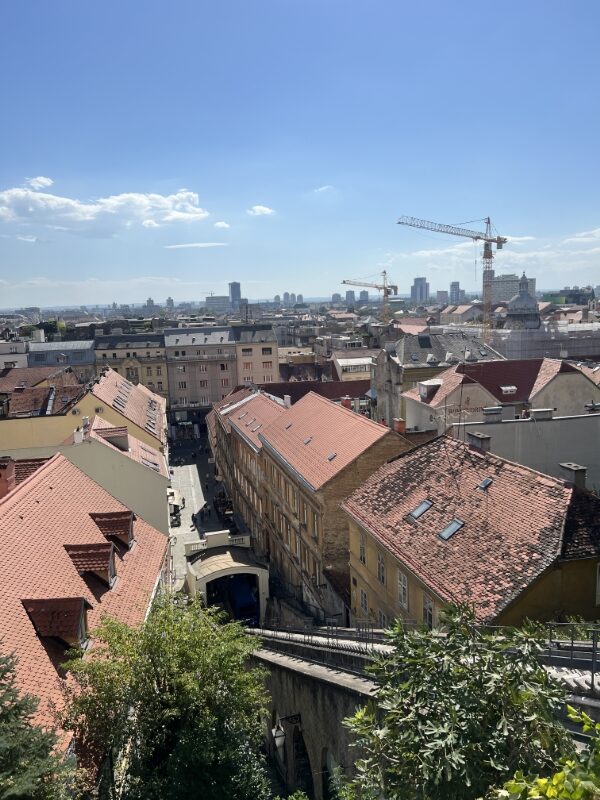
This place is perfect for retirees who still want to live in a city with good hospitals, shops, and restaurants. It’s especially suitable for those who need health care or easy access to specialists. Zagreb has several large public hospitals as well as private clinics where supplemental insurance can get you quick appointments. Overall costs aren’t as high as in major cities in Western Europe, but winter is much colder than in other cities because it’s in the north of the country. Plus, some areas are filled with old buildings without elevators, which might not be ideal for seniors who need to use a wheelchair.
For living expenses, singles living simply can expect to spend around €800 – €1,000 per month. Couples who want to live comfortably can budget about €1,400 – €1,800 monthly. Rent for a downtown apartment is about €500 – €800, while purchasing a condo for long-term investment starts at about €2,500 per square meter.
Dubrovnik: Gorgeous, but You’ll Need a Budget
Dubrovnik is a city I fell in love with from the first step inside the ancient city walls. The orange-roofed houses line the hills stretching down to the clear blue sea, making it a famous location in the hit series Game of Thrones and known as “the most beautiful city in Croatia.” But with beauty comes higher costs. Retirees who choose to live here often have a relatively high budget and seek tranquility rather than convenience.
Though there are many tourists during the summer, at other times of the year, this town is quiet and simple like the countryside. Renting an apartment in the old town costs between €1,000 – €5,000 per month, while buying a house in the city area is around €3,500 – €5,000 per square meter, depending on proximity to the sea and the view. Singles should budget around €1,000 – €1,300 per month, while couples can expect to spend €1,800 – €2,500 per month.
Watch out: This city is built on a slope, and the old town center has no roads for cars. Plus, the streets are made of old, slippery bricks, which makes walking up and down pretty challenging—especially for seniors or those in wheelchairs. Even I, being fit, have slipped and fallen because the rain makes it doubly slick. Also, the overall cost of living and housing prices are higher here than any other city on this list.
Rijeka: A Peaceful City Connecting Central Europe
Rijeka might not be as familiar to the average tourist as Zagreb or Dubrovnik, but Croatians know it as an important port city that’s also conveniently connected to Italy and Slovenia. It’s perfect for retirees who want to live a quiet life by the sea yet still have the option to drive to another country within a few hours. Due to its proximity to Italy and location within a bay, it occasionally experiences PM2.5 dust pollution, resulting in a somewhat humid and windy climate, especially in winter. Additionally, some areas have hilly terrain, necessitating a fair bit of reliance on personal cars for daily travel.
I once visited a friend’s family in Rijeka and immediately felt the slow pace of life. The people are friendly, and the cost of living is lighter than in big cities. If you’re single and thrifty, you can get by with just around €600 – €800 per month, while couples would spend about €1,100 – €1,400. Rent is around €350 – €600 per month, and if you’re looking to buy a home on the hillside or a vacation home, prices start at an appealing €1,800 per square meter.
Šibenik: A Small Town Full of Warmth
The last city I want to recommend is Šibenik, a small, peaceful seaside town that’s much warmer than you’d expect. There’s no big mall or many fancy shops here, but it has charming local markets, traditional bakeries, and old churches on every corner. This is the city that makes me feel, “This is what a laid-back retirement is all about.” Since it’s a small town, most traveling around needs to be done by bus. For healthcare services, you might need to drive to a nearby bigger city, but with its location between Split and Zagreb, you can choose to access services from either city at your convenience.
An expat friend who retired here mentioned that he can live a self-sufficient life every day. He walks to the market, cooks his own meals, enjoys afternoon wine, and then takes a walk along the beach. That’s all it takes for him to be happy. The cost of living here is considered the cheapest on this list. A single person can live on €500 – €700 per month, while a couple would need €900 – €1,200. Rent for a one-bedroom apartment starts at €300 – €500, and buying a house begins at €1,500 per square meter.
Who is Suited for Retirement Here?
From talking with many expat friends who have moved to retire in Croatia, and from firsthand experience with those actually living here, I’ve found that people who “thrive” in Croatia tend to have a laid-back lifestyle, love nature, don’t expect luxury, but enjoy morning markets, gardening in the backyard, or simply feel happy sipping coffee by the sea. Basically, they are the chill types, nature lovers, and retired couples looking to escape the hustle and bustle of big city life for a slower pace where they can take a deeper breath.
Another group that seems to fit well here is those with a moderate budget who don’t seek a luxury resort lifestyle but also don’t want to feel the stress of expenses. Croatia offers a good quality of life at a reasonable price. Whether it’s housing, food, healthcare, or even recreational activities, there’s plenty to choose from without paying as much as in Western Europe.
Who Might Not Be a Good Fit?
On the other hand, those who might find retiring here unsuitable are people who aren’t very flexible with changes or who prefer a precise and modern system at all times, like the fast-paced bureaucracy in Germany or advanced public transportation in England. Here, you’ll find the charming “go-slow” vibe of Eastern Europe, and things may take longer than expected, such as obtaining government documents, renewing your residence permit, or even waiting for a technician to install something.
Another factor not to overlook is language and culture. Although people in big cities can speak English fairly well, in rural or small towns, communication might rely on gestures, translation apps, or basic vocabulary. Those who close themselves off and are not open to learning new things might feel uncomfortable and isolated easily. However, if you have a bit of an explorer’s heart and are ready to smile at imperfections, Croatia could definitely become a warm new home for you.
How to Plan Your Retirement Move to Croatia?
Moving abroad for retirement is a huge deal. If you’re considering retiring in Croatia, you might want to spend about 1-2 years planning and preparing for the move.
2 Years Before the Move
If you’ve never been to Croatia, you should consider visiting at least once. You don’t need to stay long, just 1-3 months, but maybe try living there for 2 weeks, exploring different cities to see which one you like. You’ll also get familiar with the food, culture, daily life, and transport systems. In this short time, you’ll get a clearer picture of how much budget you’d need to live there comfortably.
1 Year Before Moving
Research more about the country, including visa application procedures, laws, and cultural dos and don’ts in Croatia. If anyone has chronic conditions, it’s advisable to start consulting with a doctor, discussing future treatments, or getting referrals to Croatia.
9 Months Before Moving
Start contacting the embassy or consulate to apply for a long-term stay visa. Gather information about the retiree community to plan how you’ll adjust. Additionally, begin looking for short-term accommodation to try living there before deciding to buy a permanent home. Also, manage tax matters in your home country and Croatia.
6 months before moving
Start learning some Croatian to make daily life more convenient, and begin preparing essential documents for your visa application, like your passport, financial statements, health insurance, and a rental contract or accommodation-related documents. If you’re planning to buy a house, it’s a good idea to contact agencies or real estate agents to explore the market and find properties that suit your needs. Also, plan how to manage your assets in your home country, such as selling a house or organizing the move of important belongings.
3 Months Before Moving
Apply for a long-term visa and get ready for your journey. This includes booking flight tickets and informing relevant organizations in your home country, like banks or social security, about your address change. Also, prepare yourself physically and mentally to adapt to new cultural and environmental changes you will encounter.
1 month before moving
Make sure to get a health check-up, prepare necessary medications, and review your health insurance. Also, pack only the essentials and get your finances in order, such as opening an overseas bank account (if possible) or planning for international money transfers. Additionally, don’t forget to sort out accommodation and build a social network, like connecting with friends or relevant communities, to help make starting a new life smoother and have friends to assist you.



